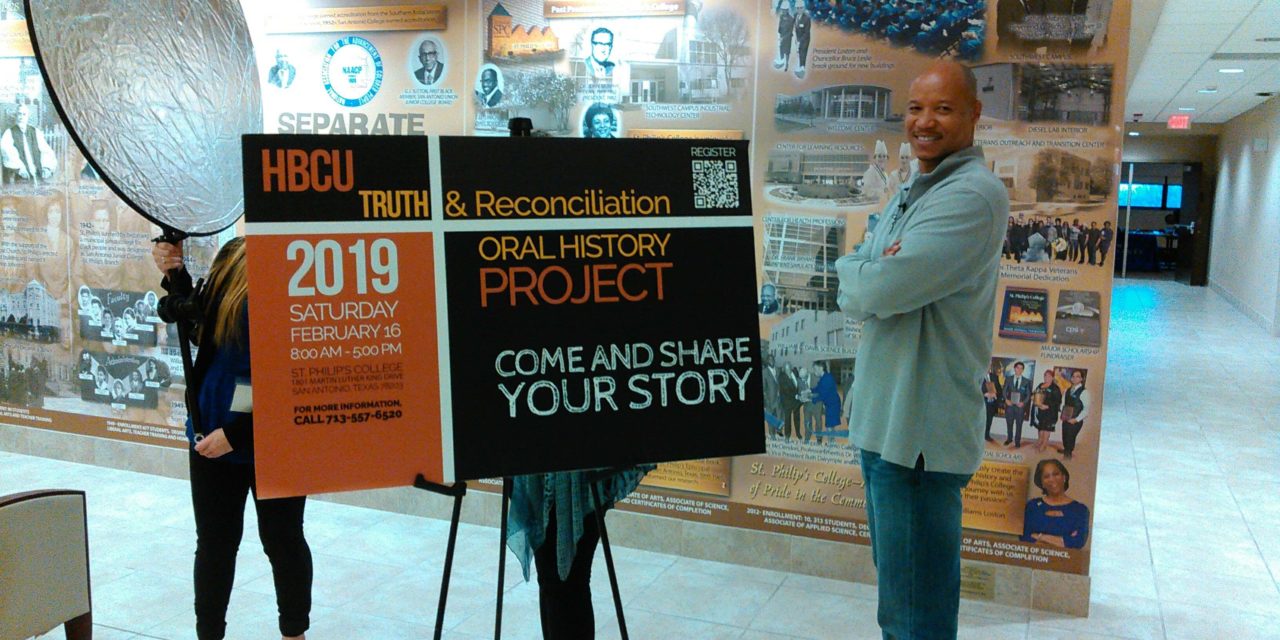Last weekend, St.Philips college hosted the third annual Historically Black Colleges or Universities (HBCU) Truth & Reconciliation Oral History Project.
The project uses the power of documented words to heal and create spiritual and social change by way of student-conducted interviews concerning experiences of racial discrimination of loved ones of color (African American and Latino/an origin).
“In our efforts to heal from the effects of racial discord in America we must be willing to expose and hear the experiences of those who have suffered. Only by truly listening to those most impacted can we begin the process of healing and reconciliation,” said Project Director and Founder of the HBCU Oral History Project, Rev. Steve Miller.
The event on Saturday was composed of 14 interview rooms with 2 students conducting interviews together in each room. About 40 people shared their stories of racism.
President of the Student Government Association at St.Philips college, Angelina MJD Jacobs, sent personal invitation letters to churches, government leaders, and organizations in the area to promote the event.
“Some people might think because racism does not exist in their areas, then it doesn’t exist at all, but we have to bring everyone into the conversation,” said Jacobs.
“ We must engage our heads, hearts, and minds. The first step to get involved with these issues is to show up.”
Rev. Miller said people of color have lost their agency because they feel depressed.
“Oppression leads to depression and when you’re depressed you don’t want to do anything but lay in bed and cry. Before you can do something about it, you have to allow yourself to heal.”
He believes these stories and, their related research, will be used to foster healing at the personal level and reconciliation at the national level to inform policy changes within the government and spiritual changes from a common person’s perspective. Additionally, Rev. Miller wants to use the evidence of this project to galvanize the Church, and its compassion, because it’s “morally” authoritative.
He explained that many church organizations are afraid to expand past charitable giving into “thornier issues” because they turn away from the problems at the root.
“There are multiple churches in every neighborhood. They [the churches] are one of the most powerful social assets sitting dormant,” said Rev. Miller.
He wishes to distinguish “Social Justice” from “Biblical Justice” by encouraging church communities to engage the root of social issues versus using charity to only treat the symptoms of social issues.
“These stories will be employed to encourage The Church to take a leading role in matters of racial equality and relationship building, because, as these stories will tell, people are hurting. The story of Exodus and of the Bible tells us the mere fact of being heard activates the compassion and healing power of God of which the United States and its current racial environment so desperately need.”
Miller recognized the importance of storytelling when he moved to Bastrop, Texas in 2009 where he began his humanitarian efforts working for human rights in the State of Texas.
His work resulted in Federal civil rights investigations by the Department of Education’s Office of Civil Rights and the United States Department of Justice’s Community Services Division within the Texas educational system. His work has brought increased equity to hiring processes, enlarged job opportunities, and fostered a greater understanding of institutional partiality through education.
He has coordinated and won legal actions at the Federal court level and has been the stimulus of rewrites of discipline policies, resulting in fewer loved ones of color being caught up in the educational system disciplinary apparatus, which highly correlates with elevated juvenile justice and mass incarceration rates.
Training for the event began earlier this month where students learned best practices for conducting emotionally charged interviews and how to operate video and microphone equipment for archival purposes.
Friday was dedicated to classes concerning the origins of racism and slavery in America, the role of music in social movement and chattel slavery. Chattel slavery is also referred to traditional slavery because people are treated as the chattel, personal property, of the owner and are bought and sold as commodities. Typically, under the chattel slave system, slave status was imposed on children of the enslaved at birth.
These classes were conducted by various faculty representing 8 HBCU and two Texas independent universities including Wiley College of Marshall, Texas and Texas Southern University, Prairie View A&M University, Southwestern Christian University, Jarvis Christian College, St. Philip’s College, Huston-Tillotson University of Austin and Baylor University.
The stories from this project will be published by Baylor Press and used to write a curriculum about racial reconciliation.
The event is also sponsored by the Austin Presbyterian Theological Seminary and the United States Christian Leadership Organization which Rev. Miller founded.
“Sometimes community organizers can be mean because of the nature of the work, they get jaded, but we cannot afford to lose compassion and empathy.”
Filmmaker Chealsea Landin participated in the event and said sympathy is so different from empathy and thinks America needs to make that distinction.
Rev. Miller hopes that next year each HBCU and Christian sponsor will host their own archival stations at their own campuses to collect more stories from all over Texas.
“Our overarching goal is to train these students how to be their own community organizers,” said Rev. Miller.
Historically Black Colleges and Universities Oral History Project









